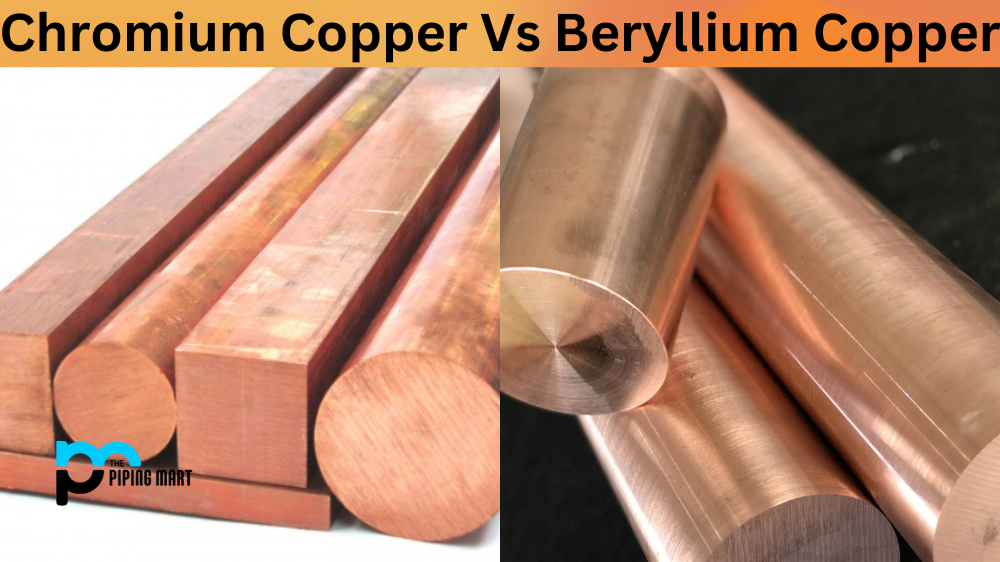Coppers are widely used for various industrial applications thanks to their excellent strength, thermal and electrical conductivity, and corrosion resistance. While many different types of copper alloys are available in the market, two of the most popular are Chromium Copper and Beryllium Copper. Both offer unique properties, making them ideal for specific applications. In this blog post, we’ll explore the battle of the coppers – Chromium Copper Vs Beryllium Copper – to help you make an informed decision for your next project.
What is Chromium Copper?
Chromium Copper, also known as C18200, belongs to the group of high copper alloys. It contains between 0.6% and 1.2% chromium, which gives its improved strength and hardness. Chromium copper is also known for its excellent resistance to softening at high temperatures, making it ideal for welding and brazing applications. It is frequently used in welding electrodes, fuse parts, and electrical contacts. Furthermore, Chromium Copper offers excellent resistance to corrosion, making it suitable for marine applications or environments with high humidity.
What is Beryllium Copper?
On the other hand, Beryllium Copper is a copper alloy that contains up to 3% beryllium. This alloy is known for its unique high strength, stiffness, and conductivity combination. It also exhibits excellent corrosion resistance and excellent fatigue resistance. Due to its unique properties, Beryllium Copper is used in various applications, including aerospace, automotive, plastic moulds, and electrical contacts. However, special care must be taken when machining this alloy, as it can release toxic beryllium dust when subjected to mechanical stress.
Difference Between Chromium Copper and Beryllium Copper
Properties
While Chromium Copper and Beryllium Copper are popular copper alloys, they differ in strength, thermal conductivity, corrosion resistance, and price. Chromium Copper offers a slightly higher strength than Beryllium Copper, making it ideal for applications that require high strength and wear resistance. However, Beryllium Copper exhibits superior thermal and electrical conductivity, making it suitable for applications requiring excellent heat dissipation. Additionally, Beryllium Copper is more expensive than Chromium Copper, mainly due to raw materials and machining costs.
Ecofriendly
Regarding environmental concerns, it’s worth noting that Beryllium Copper is classified as a hazardous material due to the potential health risks associated with beryllium exposure. However, with proper handling, it’s possible to mitigate these risks and use Beryllium Copper safely. Meanwhile, Chromium Copper is considered safer and easier to handle, making it a popular choice for applications requiring high safety.
Applications
Both alloys are used in various applications where high strength and resistance to corrosion are required. Some examples include electrical connectors, springs, and tools.
How do these two alloys compare?
Both alloys are known for their high strength and resistance to corrosion. However, beryllium copper is typically stronger than chromium copper. Additionally, beryllium copper has a higher melting point than chromium copper.
Which Alloy is better?
There is no definitive answer as to which alloy is better. It depends on the specific application and what properties are more important.
Conclusion
In conclusion, Chromium Copper and Beryllium Copper are excellent copper alloys with unique properties suitable for specific applications. While Chromium Copper is known for its high strength and corrosion resistance, Beryllium Copper offers superior thermal and electrical conductivity. However, special care must be taken when machining Beryllium Copper, and it’s generally more expensive than Chromium Copper. Ultimately, the choice between the two will depend on the specific requirements of your project, as well as your budget and environmental concerns.

Hey, I’m Krutik, a casual blogger expert in the metal industry. I am passionate about providing valuable information to my readers. With a background in engineering and construction, I like playing Cricket & watching Netflix shows in my free time. Thank you for visiting my blog, and I hope you find my information helpful!




